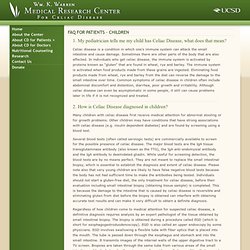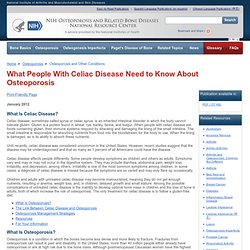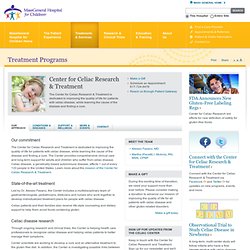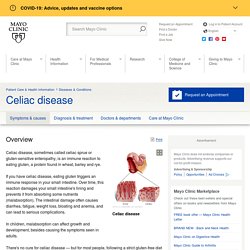

Wm. K. Warren Medical Research Center for Celiac Disease. FAQ for Patients - Children 1.

My pediatrician tells me my child has Celiac Disease, what does that mean? Celiac disease is a condition in which one's immune system can attack the small intestine and cause damage. Sometimes there are other parts of the body that are also affected. In individuals who get celiac disease, the immune system is activated by proteins known as "gluten" that are found in wheat, rye and barley. 2. Many children with celiac disease first receive medical attention for abnormal stooling or for growth problems. Several blood tests (often called serologic tests) are commercially available to screen for the possible presence of celiac disease.
Regardless of how children come to medical attention for suspected celiac disease, a definitive diagnosis requires analysis by an expert pathologist of the tissue obtained by small intestinal biopsy. 3. Genetic screening, on the other hand, is not affected by age, testing methods or diet and can be an excellent tool. 4. 5.
What People With Celiac Disease Need to Know About Osteoporosis. January 2012 What Is Celiac Disease?

Celiac disease, sometimes called sprue or celiac sprue, is an inherited intestinal disorder in which the body cannot tolerate gluten. Gluten is a protein found in wheat, rye, barley, farina, and bulgur. When people with celiac disease eat foods containing gluten, their immune systems respond by attacking and damaging the lining of the small intestine.
The small intestine is responsible for absorbing nutrients from food into the bloodstream for the body to use. Until recently, celiac disease was considered uncommon in the United States. Celiac disease affects people differently. Children and adults with untreated celiac disease may become malnourished, meaning they do not get enough nutrients, resulting in anemia, weight loss, and, in children, delayed growth and small stature. What Is Osteoporosis? Osteoporosis is a condition in which the bones become less dense and more likely to fracture. Risk factors for developing osteoporosis include: Center for Celiac Disease Research: University of Maryland School of Medicine. Interview with Dr.

Alessio Fasano on the Center for Celiac Research — Past & Future Dr. Alessio Fasano, director of the Center for Celiac Research, speaks with Jules Shepard on The Gluten Free Voice Radio Show to discuss the Center’s future and the move to MassGeneral Hospital for Children. Dr. Fasano: Gluten Sensitivity Biomarker Likely Coming Soon Prominent celiac disease and gluten sensitivity researcher Dr. Guidance on Probiotics Dr. Center for Celiac Research Joins MassGeneral Hospital for Children The Center for Celiac Research, under the leadership of Alessio Fasano, MD, has moved from Baltimore to Massachusetts General Hospital for Children (MGHfC) in Boston.
Who Has the Guts for Gluten? New York Times article features Alessio Fasano, MD, of the Center for Celiac Research & Treatment at MassGeneral Hospital for Children. Make Gluten-Free Food Safe for Patients and Consumers Calling for action on the final steps before implementation of safe gluten-free labeling regulations, Dr. Celiac disease. Overview Celiac disease Your small intestine is lined with tiny hair-like projections called villi, which work to absorb vitamins, minerals and other nutrients from the food you eat.

Celiac disease damages the villi, leaving your body unable to absorb nutrients necessary for health and growth. Celiac disease, sometimes called celiac sprue or gluten-sensitive enteropathy, is an immune reaction to eating gluten, a protein found in wheat, barley and rye. If you have celiac disease, eating gluten triggers an immune response in your small intestine. In children, malabsorption can affect growth and development, besides causing the symptoms seen in adults. There's no cure for celiac disease — but for most people, following a strict gluten-free diet can help manage symptoms and promote intestinal healing.
Symptoms The signs and symptoms of celiac disease can vary greatly and differ in children and adults. Diarrhea Fatigue Weight loss Bloating and gas Abdominal pain Nausea and vomiting Constipation.